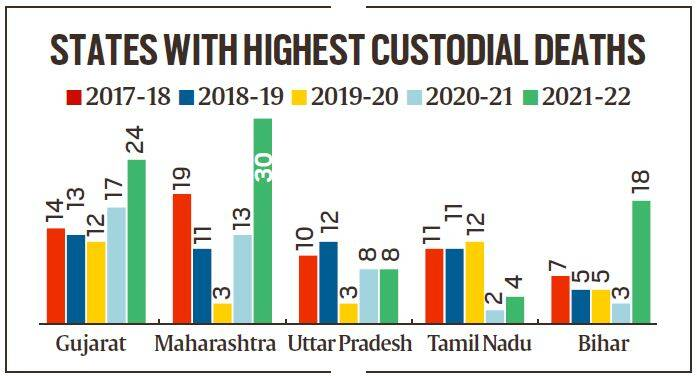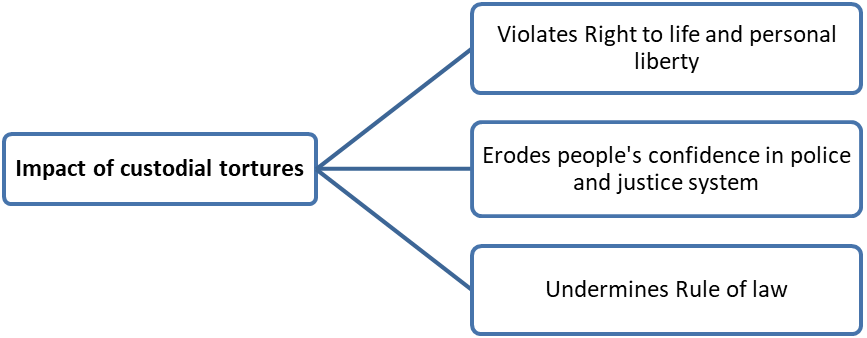Custodial tortures in India
2023 FEB 22
Mains >
Polity > Judiciary > Criminal justice system
IN NEWS:
- The number of deaths in police custody witnessed a nearly 60% increase over the last three years and 75% over the last two years across the country, data provided by the Ministry of Home Affairs (MHA) in the Rajya Sabha has revealed.
- The data also revealed that the number of such cases rose 10 times in Maharashtra, three times in Kerala and Bihar, and two times in Gujarat, Uttar Pradesh and Karnataka.

CUSTODIAL DEATH:
- Custodial death refers to the death of an accused during pre-trial or after conviction.
- The death is caused by the direct or indirect act of police during their custody.
- Custodial deaths can be classified into three types:
- The death occurred in police custody
- The death occurred in judicial custody
- The death occurred in the custody of army or paramilitary forces
WHY CUSTODIAL DEATHS PERSIST?
- Poor investigation system:
- State police officers lack the expertise and forensics infrastructure required to conduct professional investigations. Hence, they use third degree measures to secure confessions, which end up harming the accused.
- Delayed justice:
- Owing to the work pressure, poor quality of investigation, delays in judiciary and low conviction rates, custodial tortures are adopted as a means of ensuring ‘quick justice’. This inflicts physical and mental suffering on the accused.
- Public pressure:
- Public often have unrealistic expectations on crime control and delivery of justice. Hence, they condone practices like custodial tortures and fake encounters.
- Poor state of prisons:
- Indian prisons are overcrowded and undertrials are subjected to prolonged detention. This results in physical and psychological torture of inmates, leading them to commit suicides.
- Read more on Prison reforms here
- Challenges in evidence collection:
- Many custodial deaths are categorised as suicides. However, it is challenging to establish whether they committed suicide or whether they were forced.
- Some of the tactics adopted by police makes it difficult to prove the fault. For instance, the accused are tortured by the police before an arrest is made, which enables the police to claim that the injuries are not caused due to custodial brutality.
- Also, many police stations are not equipped with CCTV cameras and there is limited usage of videography during investigations. This makes evidence collection in alleged custodial tortures difficult.
- Absence of independent investigation:
- The amended section 176 (1A) of the CrPC mandates judicial inquiry into every case of death, rape and disappearance in the custody. However:
- Most states have flouted the mandatory judicial inquiry into custodial deaths.
- Probes are generally taken by the police itself, but the fraternity within force undermines the independence of the investigation.
- Low conviction rates:
- As per the National Human Rights Commission data, disciplinary action was initiated in one case during the last five financial years. Hence, the law has failed to set a strong precedent.
- Shortcoming in laws:
- Armed Forces (Special Powers) Act gives excessive powers to the armed forces without adequate safeguards for the public.
- Despite the Law Commission’s proposal of an anti-torture law in 2017, India does not have any anti-torture law.
- India has not yet ratified the UN Convention Against Torture (UNCAT), 1984.

EFFORTS TO PREVENT CUSTODIAL TORTURES:
I. INTERNATIONAL:
- Universal Declaration of Human Rights, 1948 (UDHR)
- UDHR explicitly states that every person should be treated as innocent until the individual is found guilty.
- According to Article 5 of UDHR, no person should be tortured or treated with cruelty, irrespective of the geographical location of the individual.
- International Covenant on Civil and Political Rights, 1966
- Article 6 of the International Covenant on Civil and Political Rights states that every individual has the inherent right to life and no one should be arbitrarily deprived of his right to life. ICCPR prevents cruel, degrading and inhuman treatment of prisoners.
- UN Convention against Torture and Other Cruel, Inhuman or Degrading Treatment or Punishment, 1984
- The ‘Torture convention’ requires member states to take effective measures to prevent torture in any territory under their jurisdiction.
- It also forbids member states to transport people to any country where there is reason to believe they will be tortured.
- India has signed the treaty but has not ratified it.
II. NATIONAL:
- Constitutional:
- Article 21:
- Article 21 states that “No person shall be deprived of his life or personal liberty except according to procedure established by law”.
- Article 22:
- Article 22 provides Protection against arrest and detention in certain cases.
- Seventh schedule:
- Police and public order are state subjects as per the Seventh Schedule. So, it is primarily the responsibility of the state government concerned to ensure protection of human rights of the citizens.
- Provisions in the Code of Criminal Procedure, 1973:
- Section 46 of CrPC explicitly denies the police a right to cause the death of a person who is not accused of an offence punishable with death or with imprisonment for life.
- CrPC provisions prohibits any investigating officer to use a threat or any other sort of inducement to obtain a confession from the accused which would be presented as evidence against him.
- CrPC mandates that signature and recordings of confessions are made properly and this should be further corroborated by the support of the Magistrate stating that confession has been made voluntarily.
- Indian Evidence Act, 1872:
- All the confessions made by the accused by succumbing to the threat, promise or inducement of investigating agencies would not be admissible in the court of law.
- The Protection of Human Rights Act (PHR), 1993:
- The Act has established the National and State Human Rights Commissions to look into alleged human rights violations by public servants.
WAY FORWARD:
- Implement important Supreme Court directives in Prakash Singh case:
- Constitute a State Security Commission in every state that will lay down policy for police functioning, evaluate police performance etc.
- Constitute Police Complaints Authorities at the state and district levels to inquire into allegations of serious misconduct and abuse of power by police personnel.
- Separate the investigating police from the law and order police to ensure speedier investigation, better expertise and improved rapport with the people.
- Capacity building:
- The police force must also be provided with mandatory basic forensic and psychology training and periodic workshops to sharpen their abilities.
- Also, Padmanabhaiah Committee on police reforms had recommended the police force should receive greater training in soft skills such as communication, counselling and leadership to deal with the public.
- Strong action against police brutality:
- Extra judicial executions are an anathema to the Rule of Law. Hence, fair investigations and stringent legal actions must be taken against all cases of extra judicial killings in the country.
- Infusion of technology:
- Technology must be leveraged wherever possible to improve the reporting of cases, quality of investigation and conviction for offences.
- Judicial reforms:
- Proactive measures must be taken to reduce the vacancies in judicial posts, improve accessibility and reduce the delays in justice.
- Prison reform:
- The government should look at the recommendations made by Mulla committee and Amitava Roy committee and ensure humane conditions in the prisons.
PRACTICE QUESTION:
Q. Custodial tortures are an anathema to the rule of law. Analyse the reasons behind custodial tortures and suggest measures to tackle the issue?

